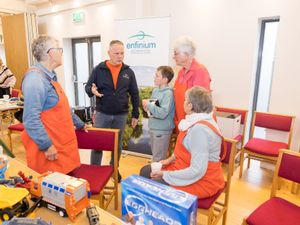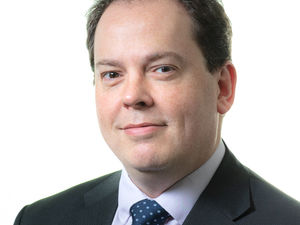Unemployment falls again in the West Midlands
Unemployment has fallen in the West Midlands to 169,000 in the three months to April.
The number out of work was down 8,000 on the November to January period, but up 26,000 from 12 months before.
The number employed in the region was also up by 20,000 in the period to 2.8 million.
Britain saw a record surge in the number of workers on payrolls last month as hospitality and entertainment firms hired for indoor reopening. The Office for National Statistics (ONS) said there were 197,000 more people in payrolled employment last month compared with April, the highest rise since these records began in 2014.
The ONS said that, for the first time since the pandemic struck, the hardest-hit sectors such as hospitality, accommodation and arts and entertainment saw the strongest growth in payrolled workers.
It comes after indoor hospitality reopened on May 17 in a boost to cinemas, restaurants, pubs and bars, which have been battered by lengthy Covid-19 restrictions.
The West Midlands employment rate of 74.2 per cent compared to 75.2 per cent for the UK as a whole with 32.4m now in work.
The national unemployment rate was down 0.3 percentage points to 4.7 per cent with 1.61m with the West Midlands rate at 5.7 per cent.
The jobless rate dropped for the fourth month in a row from 4.8 per cent in the previous three months.
The national total claiming unemployment benefits, including Universal Credit, last month was 2.5m – a fall of 92,600.
The West Midlands saw a fall of 11,080 claimants to 255,355 – seven per cent of the working population.
In the Black Country Sandwell saw the biggest fall of 685 to 19,070 (9.3 per cent) with Walsall down 640 to 14,510 (8.4 per cent). Dudley had 595 fewer claimants at 13,490 (seven per cent) with Wolverhampton reducing by 495 to 16,755 (10.3 per cent).
Staffordshire saw a reduction of 1,560 to 23,400 (4.4 per cent) with Stafford down 220 to 3,165 (3.8 per cent), Cannock Chase falling 195 to 3,145, South Staffordshire with 170 fewer at 2,775 and Lichfield dropping 145 to 2,585.
Wyre Forest, including Kidderminster, had 235 fewer claimants at 3,110 (5.3 per cent).
Richard Rawlings, employer and partnership manager for Jobcentre Plus in the Black Country said a Jobs for June initiative was being run in the area.
"Employers, partners and training providers are coming into centres to talk to youth customers and events are being held to promote the campaign including interviewing 16 to 24-year-olds for Kickstart scheme placements."
Mr Rawlings said job creation was continuing with HS2 Ltd confirming that more than 1,000 jobs will be created by the joint venture that will build a landmark station in the centre of Birmingham.
In the Black Country DX Freight and DX Ikea in Willenhall are recruiting for a number of warehouse and heavy goods vehicle drivers.
Staffordshire County Council’s deputy leader and cabinet member for economy and skills Councillor Philip White said: “It is encouraging to see another decrease in the number of out of work claimants over the last two months in Staffordshire and we remain lower than both regional and national figures.
“We are starting to see signs of recovery in our local economy despite the continuing impact of the pandemic but we know this impact has been significant for our businesses and communities with some sectors continuing to be heavily impacted.
“The delay to the further easing of restrictions will come as a blow, particularly to our hospitality sector and so it’s important the support is there, both from the county council, our partners and central government.
Councillor Udey Singh, of Wolverhampton's Conservative group, said: “The small drop in Wolverhampton’s Unemployment rate is to be welcomed, but we need to recognise the vast challenge facing the city. Over 16,500 people are currently out of work with nearly half of the city’s wards seeing an unemployment rate above 10 per cent. It is essential the council makes the most of the Government support available to tackle the city’s chronic unemployment problem.”
Chancellor Rishi Sunak said: "Our Plan for Jobs is working – the latest forecasts for unemployment are around half of what was previously feared and the number of employees on payroll is at its highest level since April last year.
"We understand the value of work and the distress caused by unemployment – that is why we are continuing to support people and jobs.
"The furlough scheme is running all the way through until September and we are creating new routes into work through apprenticeships, Kickstart placements for young people as well as targeted support for the long-term unemployed."
"Our Plan for Jobs is working - creating new opportunities and boosting job prospects right across the country - as jab by jab we lay the foundations to build back better."
Minister for Employment Mims Davies said: "There are real signs of recovery in the labour market with tens of thousands of Work Coaches working hard to support people across our growing network of Jobcentres to help build their skills, get interview ready, and find their next roles – with over three quarters of a million vacancies out there.
Sam Beckett, ONS head of economic statistics, said: "The number of employees on payroll grew strongly in May, up by almost 200,000, although it is still over half a million down since the pandemic struck.
"Job vacancies continued to recover in the spring, and our early estimates suggest that by May the total had surpassed its pre-pandemic level, with strong growth in sectors such as hospitality.
"Meanwhile the redundancy rate remains subdued, while the number of employees on furlough has continued to decline."
Job vacancies rocketed by 24 per cent quarter on quarter – up 147,000 to 758,000 between March and May, thanks to a hiring spree across these sectors amid reports of some firms resorting to financial incentives to attract workers.
Vacancies are now just 27,000 below levels seen before the pandemic, with most industries having fully recovered, according to the ONS.
Unemployment has been kept in check by the furlough scheme, with around three million people still on the wage support, which ends in September and has not been extended despite the delay to the full lifting of restrictions.
The data revealed there was also a record jump in earnings, with average pay excluding bonuses up 5.6% in the three months to April, though the ONS said this was compared with a year earlier, when there was a big fall, while many jobs axed in the pandemic have also being lower-paid roles.





